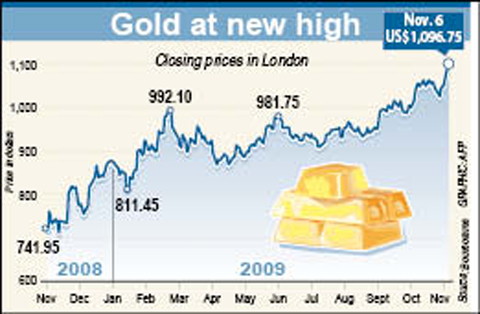Gold prices struck a series of record highs this week, eventually spiking above US$1,100 for the first time, as Asian central banks snapped up the precious metal as an alternative to the dollar.
PRECIOUS METALS: The price of gold hit a record high above US$1,100 an ounce in London trading Friday following a report that Sri Lanka had joined India in purchasing the precious metal in favour of a weak US currency.
“The Central Bank of Sri Lanka has announced that it is buying gold to diversify its reserves,” industry body the World Gold Council (WGC) said in a statement issued before gold struck a record high of US$1,101.42.

Also on Friday, the dollar weakened against the euro as official data showed the US unemployment rate in double digits for the first time since 1983 after reaching 10.2 percent last month.
Gold futures meanwhile had struck a series of highs earlier in the week after the IMF said it had carried out a massive sale of the yellow metal to India.
“Over the past year central banks, which have been net sellers of gold are now a new and increasingly important source of demand,” WGC chief executive Aram Shishmanian said in the council’s statement. “This latest announcement demonstrates that many central banks are reassessing their reserve asset management policies.”
Gold had reached a record high of US$1,087.80 on Tuesday as the IMF said it had sold 200 tonnes of gold to India’s central bank last month for US$6.7 billion to bolster its finances.
Gold and other commodity prices have surged in recent months amid a move away from a sliding dollar. The move accelerated last month on a report that Gulf states may stop using the greenback for oil trading.
The metal is also winning support from fears over a possible spike in inflation.
By late Friday on the London Bullion Market, gold surged to US$1,096.75 an ounce from US$1,040 a week earlier.
Silver jumped to US$17.52 an ounce from US$16.57.
On the London Platinum and Palladium Market, platinum gained to US$1,359 an ounce at the late fixing on Friday from US$1,320.
Palladium climbed to US$330 an ounce from US$324.
OIL: The price of oil rebounded, briefly passing US$81 after the US Department of Energy reported an unexpected drop in crude stockpiles.
By Friday on the New York Mercantile Exchange, light sweet crude for delivery next month rose to US$78.85 from US$78.11 a week earlier.
On London’s InterContinental Exchange, Brent North Sea crude for delivery next month climbed to US$77.28 from US$76.38.

MORE VISITORS: The Tourism Administration said that it is seeing positive prospects in its efforts to expand the tourism market in North America and Europe Taiwan has been ranked as the cheapest place in the world to travel to this year, based on a list recommended by NerdWallet. The San Francisco-based personal finance company said that Taiwan topped the list of 16 nations it chose for budget travelers because US tourists do not need visas and travelers can easily have a good meal for less than US$10. A bus ride in Taipei costs just under US$0.50, while subway rides start at US$0.60, the firm said, adding that public transportation in Taiwan is easy to navigate. The firm also called Taiwan a “food lover’s paradise,” citing inexpensive breakfast stalls

TRADE: A mandatory declaration of origin for manufactured goods bound for the US is to take effect on May 7 to block China from exploiting Taiwan’s trade channels All products manufactured in Taiwan and exported to the US must include a signed declaration of origin starting on May 7, the Bureau of Foreign Trade announced yesterday. US President Donald Trump on April 2 imposed a 32 percent tariff on imports from Taiwan, but one week later announced a 90-day pause on its implementation. However, a universal 10 percent tariff was immediately applied to most imports from around the world. On April 12, the Trump administration further exempted computers, smartphones and semiconductors from the new tariffs. In response, President William Lai’s (賴清德) administration has introduced a series of countermeasures to support affected

CROSS-STRAIT: The vast majority of Taiwanese support maintaining the ‘status quo,’ while concern is rising about Beijing’s influence operations More than eight out of 10 Taiwanese reject Beijing’s “one country, two systems” framework for cross-strait relations, according to a survey released by the Mainland Affairs Council (MAC) on Thursday. The MAC’s latest quarterly survey found that 84.4 percent of respondents opposed Beijing’s “one country, two systems” formula for handling cross-strait relations — a figure consistent with past polling. Over the past three years, opposition to the framework has remained high, ranging from a low of 83.6 percent in April 2023 to a peak of 89.6 percent in April last year. In the most recent poll, 82.5 percent also rejected China’s

PLUGGING HOLES: The amendments would bring the legislation in line with systems found in other countries such as Japan and the US, Legislator Chen Kuan-ting said Democratic Progressive Party (DPP) Legislator Chen Kuan-ting (陳冠廷) has proposed amending national security legislation amid a spate of espionage cases. Potential gaps in security vetting procedures for personnel with access to sensitive information prompted him to propose the amendments, which would introduce changes to Article 14 of the Classified National Security Information Protection Act (國家機密保護法), Chen said yesterday. The proposal, which aims to enhance interagency vetting procedures and reduce the risk of classified information leaks, would establish a comprehensive security clearance system in Taiwan, he said. The amendment would require character and loyalty checks for civil servants and intelligence personnel prior to